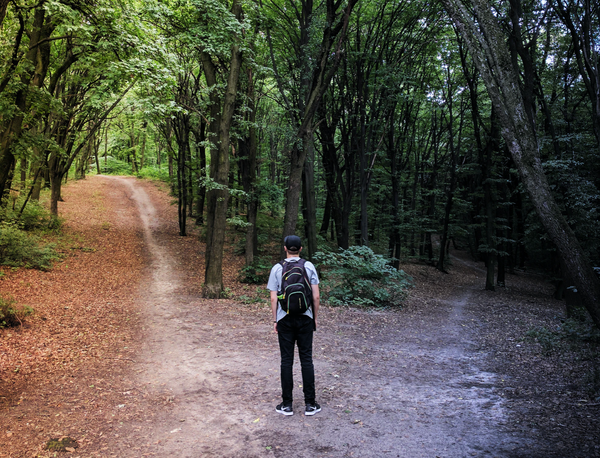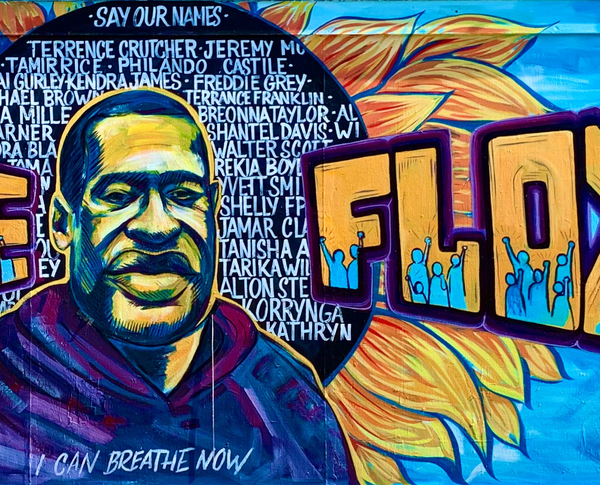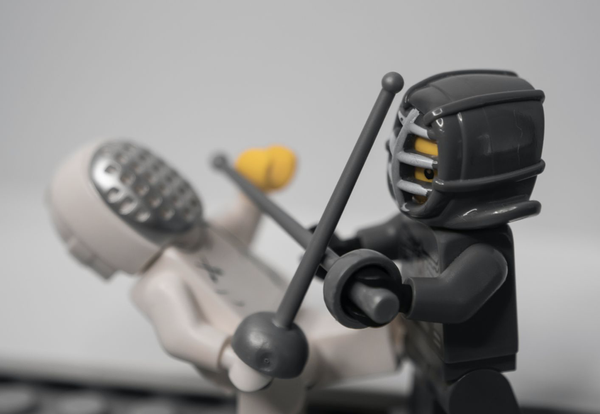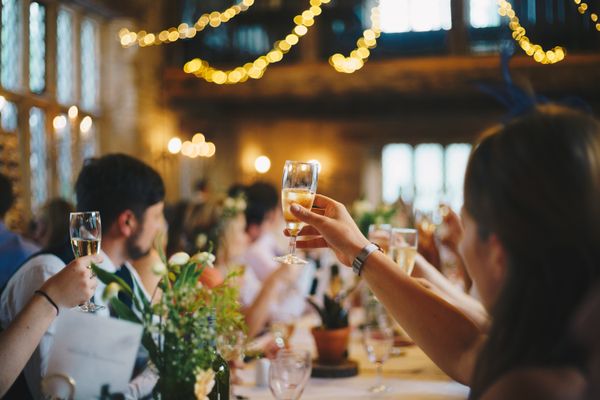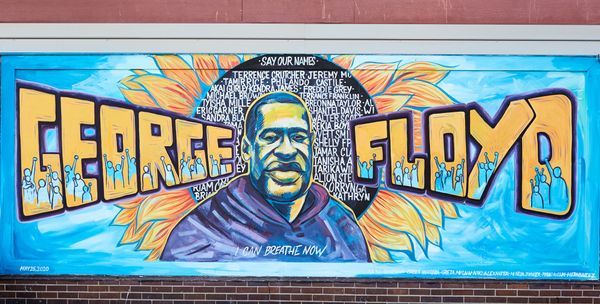A year ago to the day, May 25, 2020, George Floyd was shamelessly and brutally murdered in broad daylight on the streets of Minneapolis. As a tribute to Mr. Floyd’s life and legacy, and those of so many other Black people who have died at the hands of police, we at Our Human Family published Fieldnotes on Allyship: Achieving Equality Together, an informative and informal tool to help people better prepare to serve as allies in the fight against racism. What follows is the Foreword from the book.
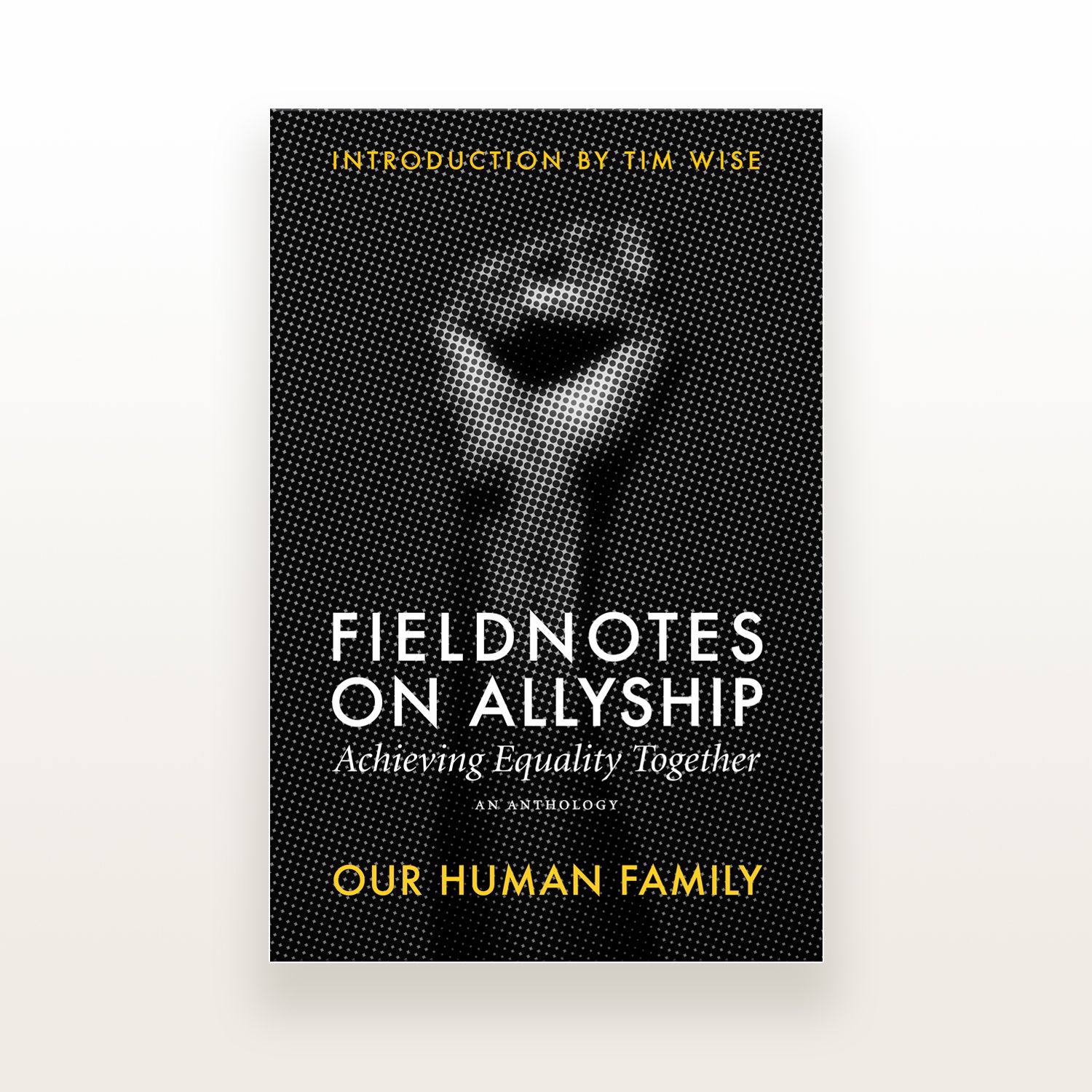
Summer 2020, people the world over learned the United States’ ugly secret known by Black people in this country for 400 years: Black lives are regarded as having little to no value. And for any Black person who dares challenge this worldview, retribution can be sure, swift, and deadly.
In 1919, fifty-four years after the abolition of the enslavement of Black Americans and thirty-nine years after Black men were granted the right to vote, July Perry led a voter registration campaign for the Black residents of Ocoee, Florida. In response, white residents lynched him, ran all of the Black residents out of town, and burned their homes, churches, businesses, and farmland to the ground. No Black person voted again in Ocoee for at least fifty years.
In 1955, fourteen-year-old Emmett Till was brutally murdered for allegedly flirting with a white woman. Two men kidnapped the boy, beat and mutilated him, shot him in the head, tied a seventy-pound fan around his neck with barbed wire, and dumped his body in a nearby river. His body was found three days later. After an hour of deliberations, Till’s murderers were acquitted by an all-white jury. Three months later, they confessed to the murder in a national magazine interview. Decades later, Till’s accuser admitted she fabricated parts of her testimony.
These problems are emblematic of the Black experience in America.
As late as August 22, 2020, Trayford Pellerin was fatally shot outside a convenience store in Lafayette, Louisianna. The following day, Jacob Blake was shot in the back numerous times at close range in Kenosha, Wisconsin. Lest you think these horrors are one-offs or a freak occurrence, the National Museum for Peace and Justice in Montgomery, Alabama, memorializes close to 4,400 known victims of terror lynchings that occurred between 1877 and 1950. These events were not the exception, but the rule that governed the lives of Black people in America. This unspoken code of inequity continues up to the present day, as felt in the deaths of our fallen brothers and sisters Trayvon Martin, Eric Garner, Michael Brown, Tamir Rice, the Mother Emanuel Nine, Sandra Bland, Philando Castile, Jordan Edwards, Ahmaud Arbery, Breonna Taylor, George Floyd, and others too many to name.
These tragedies are emblematic of the Black experience in America. The stone-cold nonchalance and frequency with which these acts of anti-Black hatred occur never cease to shake decent people to our core. We suppress the outrage over the innumerable indignities and microaggressions we endure for fear that revealing a sliver of our genuine frustration will only validate the angry Black person trope, land us in jail, or worse. We unflinchingly swim against the torrent of scorn and denigration, designed to rob us of our humanity and self-esteem. And we mask the grief that accompanies being routinely regarded as mere bit players in the show that is the history of America.
Yet we strive for the station that God has bestowed upon all men; not to stand beneath or above our white brothers and sisters, but on the same footing, shoulder-to-shoulder, as equals. Sadly, as we demonstrate our humanity and right to claim life, liberty, and the pursuit of happiness as guaranteed by our nation’s founding documents, we live in the knowledge that as sure as the sun rises, our selves or any one of our beloveds could become the next murdered and martyred trending topic or rallying cry by day’s end.
This time is unlike any other in the planet’s history.
This most recent spate of hate against Black bodies in white spaces has opened the eyes of many white Americans. But it has taken a deluge of camera phone footage documenting the murders of Black men, women, and children to convince large numbers of white people that America has a chronic anti-Black racism problem. These impromptu documentaries substantiate what Black people experience, witness, and testify to in courts daily, what white minds refuse to imagine possible or believe: Black lives are routinely being snuffed out at the hands of law enforcement officers and garden variety racists. With impunity and paid administrative leave. Now any random bystander can become a bona fide eyewitness to the murder of a Black body and upload it to the social media platform of their choice for all the world to see.
The shockwaves from this shift in the nation’s consciousness have been seismic. Americans from coast to coast are re-examining the country’s relationship with anti-Black racism and the symbols used to tell America’s history. Confederate monuments are coming down—some taken down forcibly by citizens, others quietly removed without fanfare by local and state mandates. NASCAR stunned the public and infuriated a sizable section of its fanbase when it banned the Confederate flag from its events. Corporations have issued full-throated statements of support for Black Lives Matter. Whether future deeds will align with present words remains to be seen, but it’s a long overdue and welcome step in the right direction. Even the state of Mississippi, the last to still display the Confederate battle flag, recently voted to remove the stars and bars from its state flag.
Even during the global COVID-19 pandemic, the sheer number of demonstrations and participants who have marched in opposition to the systemic racism and police brutality perpetrated against Black people has been unlike anything seen before in this country. In the streets of Minneapolis, New York, Seattle, Los Angeles, San Francisco, Chicago, and Atlanta, in hundreds of metropolitan areas and thousands of small towns around the United States, people of all ages, all ethnicities, shapes, sizes, and vocations have marched in protest. In Philadelphia on June 6, up to 80,000 people marched in solidarity and support of the notion that Black lives are to be valued.
This time is unlike any other in the planet’s history. People are taking part in a movement, not a moment. While hundreds of thousands of people have participated in demonstrations, there are many more who want to take part in realizing a more equitable world, for whom demonstrating is not a viable option. And that’s okay. Not everyone has to be the tip of the spear. There’s plenty more work to be done. Much more.
Being an ally is an unsolicited honor that is earned through supporting marginalized people in their fight for equality.
Our Human Family creates programs and educational tools to help people advocate for racial equality and inclusion. We know there are people who are unsure of where, when, or how to get involved. We saw this as an opportunity to provide them with a handbook of sorts to help prepare them for the work of equality and anti-racism. And Fieldnotes on Allyship: Achieving Equality Together was born.
Fieldnotes on Allyship is inspired by scientists’ established practice of taking notes on what they observe while out in the field. We extend its function into its design by providing generous side and bottom margins for you to jot down your observations and ruminations. Fieldnotes on Allyship is an anthology of real-world observations on:
- the precise nature of racism
- the forces that maintain systemic racism
- the preparations necessary to do the work of equality and anti-racism, and
- actionable ways to facilitate equality in support of Black, Indigenous, and People of Color (BIPOC), right where you are.
These seventeen chapters were written by authors and writers from the United States and around the world. They include anti-racism activists, authors, artists, a Masters Athlete, college professors, a retired U.S. Navy sailor, political pundits, an attorney, and anthropologists. They’re mothers, fathers, daughters, sons, sisters, and brothers—all of various ethnicities. Some names you may already know, others you may not; but by the time you read to the end of this book, their collective stories—written with integrity, empathy, and an occasional sprinkling of humor—will live in your heart and mind.
Our Human Family positions allyship as a longterm, perhaps even lifelong, commitment to the process of learning, growing, and advancement of equality. We believe that allyship is not a performative checklist of steps one completes to obtain a merit badge. Standing up for equality is its own reward. The moniker “ally” is not a self-appointed Napoleonic crown one proclaims to laud dominion over the lives of mere marginalized people. No. Being an ally is an unsolicited honor that is earned through supporting marginalized people in their fight for equality and demonstrating trust that we are the best experts on our lived experiences and needs.
And marginalized people of any ethnicity hold no less expertise because they have not been certified as such by an institution or because they are not fluent in the latest social justice lingo. For example, in my early twenties, as a Black man living in the South, I was all too aware that society lavished unmerited benefits on white people that Black people rarely, if ever, experienced. And now, a few decades later, the term “white privilege” has become common parlance. Who better to understand the experiences of what it is to be Black than someone who wakes up Black in the morning, is Black throughout the day, and is still Black when they shut their eyes at night? Serving as an ally hinges upon actively listening to those stories, and treating those served with respect and care. As you’ll discover much later in Section IV, those experiences can be known; but then, the service of an ally isn’t a zero-sum game in which total and complete understanding are prerequisites.
Throughout this book the terms Black, People of Color, and the acronym BIPOC are used extensively, but not interchangeably.
Equality and the eradication of racism are complicated subjects that require nuance in their presentation, explanation, and assimilation. No one has all the answers in solving America’s problematic relationship with equality and racism, and we at Our Human Family and the authors of Fieldnotes on Allyship are not so naive as to assume that we are presenting all of them here. Because of our varied lived experiences, those of our readers, the fluid nature of words, and their subjective interpretation, it’s incumbent upon me to at least try to start us all on the same page.
Throughout this book the terms Black, People of Color, and the acronym BIPOC are used extensively, but not interchangeably. Volumes have been written about the interpretation of these expressions and are as varied as there are opinions about who should be named as the greatest basketball player of all time. What follows are my most basic working definitions of those terms given within the context of me living as a Black man, in the southern United States, in the year 2020.
As you may have guessed, Fieldnotes on Allyship is a direct response to the racism enacted against Black people in the United States. This is not at the patent exclusion or denial of enslaved Black or any other people outside the United States, it simply means this is our first and foremost point of discussion.
Black As discussed within these pages refers primarily to the descendants of the various cultures of Africa who were brought to the British colonies, enslaved, and scattered across the United States. Yes, this includes people who have one parent who is a descendant of those enslaved people and another parent of different ethnicity. “Black” within these pages is not a pejorative, a put-down, or some linguistic sleight of hand. We use it unapologetically and with intentionality to recognize the inherent humanity, dignity, culture, and significance of people of the African diaspora.
Brown The term as we use it, refers to people of Latin and Hispanic ethnicity, as well as but not limited to non-white people of Middle Eastern countries.
People of Color (POC) Now here’s where things get tricky. Given Our Human Family’s life-affirming regard for all people, we use this phrase to encompass Black and other non-white people around the world, including Asia, and Indigenous Australians, while collectively respecting their individual struggles for equality, dignity, and autonomy. We do not use it to diminish, erase, or ignore their endeavors. And we note that the designation can be problematic. There is a tendency for people to use People of Color interchangeably when Black is far more honest and accurate. For example, if you consider “people of color” within the setting of segregation in the 1960s, the term is limiting and restrictive in that segregation efforts were inordinately directed at Black people.
Black, Indigenous, and People of Color (BIPOC) This phrase, used mostly in reference to the United States, emphasizes the oppression experienced by Black and Indigenous people, including Asian, Hispanic, Latin, and Pacific Islanders, but not at the exclusion of other ethnicities not mentioned here who may reside in North America. This term is not meant to create a hierarchy of trauma or distress. All oppression is detrimental to the oppressed.
White People characterized by light pigmentation of their skin. Currently, the dominant culture in America rooted in western European traditions. We won’t delve into how the notion of “white” came to be here. Fear not; “whiteness” is a topic all unto itself that is addressed in greater detail in Part II.
I cannot stress this enough: These terms are abbreviations of sorts for the most complicated and intricate creatures on Earth—humans. Just know that our intention is not diminish the dignity of any human being, but to serve a greater good. Defining terms that are infinitely subjective is problematic at best, no matter how we slice it.
As you may have gathered, without the overarching construct of race and racism, there’s no need for the labels, bigotry, or racism. That’s the world we’re hoping to inspire you to create. And we do hope that Fieldnotes on Allyship broadens your understanding of your Black brothers and sisters, of the wonderful commonalities we share with you, and the gloriously radiant ways we are different.
Because once you see someone as human, you can never unsee their humanity.
We invite you to join us on our journey to achieve equality for all members of our human family.
Love one another.
Clay Rivers
President, Our Human Family, Inc.
Portrait of George Floyd by Nikkolas Smith
Fieldnotes on Allyship: Achieving Equality Together, available now in print at Amazon. Discounted digital editions for iPad, Nook, and Kindle available at ourhumanfamily.org.
Digital editions also available in Australia, Canada, France, Germany, Italy, Japan, Mexico, and the United Kingdom.



